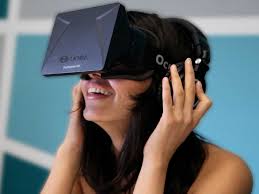VR – Virtual Reality will be the next generation’s Facebook. Just as 3-D printers are now starting to be serious disruptors, having moved from the ‘sci-fi’ edge, so too will that be the trajectory of VR.
 With the launch of the 2015-16 NBA season in America, the NBA has become the first major sports league to offer a live streamed version of a game in virtual reality. The game selected for this debut was that between the New Orleans Pelicans and the Golden State Warriors. The NBA has partnered with VR company NextVR and fans can Samsung’s Gear VR headset that works in partnership with the company’s Galaxy Note 4 and Galaxy S6 and S6 edge. Using the headset would enable fans to ‘see’ the game as if they were there. Look down and you see the floor, look left and you see a basket, look right…you get the picture.
With the launch of the 2015-16 NBA season in America, the NBA has become the first major sports league to offer a live streamed version of a game in virtual reality. The game selected for this debut was that between the New Orleans Pelicans and the Golden State Warriors. The NBA has partnered with VR company NextVR and fans can Samsung’s Gear VR headset that works in partnership with the company’s Galaxy Note 4 and Galaxy S6 and S6 edge. Using the headset would enable fans to ‘see’ the game as if they were there. Look down and you see the floor, look left and you see a basket, look right…you get the picture.
Pause and think about the implications of VR. Think about the inevitable disruption across multiple fronts. A colleague recently said to me, “I have stopped thinking about what VR will impact and have started to try and think about what won’t (be impacted by VR)”.
VR will change the way pretty much everything is sold. Virtual tours of possible holiday destinations, restaurants, houses on the market, cars we might be considering buying…anything! It will change the way we might engage with pets. Instead of owning a dog, we might have a VR experience with one that comes with no expense, no hassle and no need for kennels when we are away. VR will impact on relationships and most certainly create a whole new dimension to the already massive porn industry. Other sports will soon follow the NBA’s lead and home entertainment will be impacted, as TV sets will be used for everything but one-dimensional viewing.
In TomorrowToday we constantly help industries and companies better understand disruption and what that means for their future. When it comes to innovation, the challenge is no longer merely one of product and service innovation but rather the need to innovate our entire business model. Disruption has that kind of impact. Rethinking one’s business model is easier said than done and no many succeed in doing it. Most companies are neither set-up for such nor do they have the internal capacity within their DNA to overhaul their business model. Companies have fine-tuned business efficiencies at the expense of innovative, cannibalising processes that lead to the ‘next thing’. Furthermore challenging these efficiencies is to challenge the very core of what is regarded as ‘good business practice’ and carries with it the stigma of being a trouble-maker or corporate dissident. We say we need these ‘dissidents’ but then are unable to ‘manage them’ – the very term being an oxymoron that merely serves to denote the problem.
VR will change our future as will fusion energy, graphene, 4-D printers and microlattice.
Best be ready.
Tomorrow is today’s agenda. At least it ought to be if that is you want to be around tomorrow!

